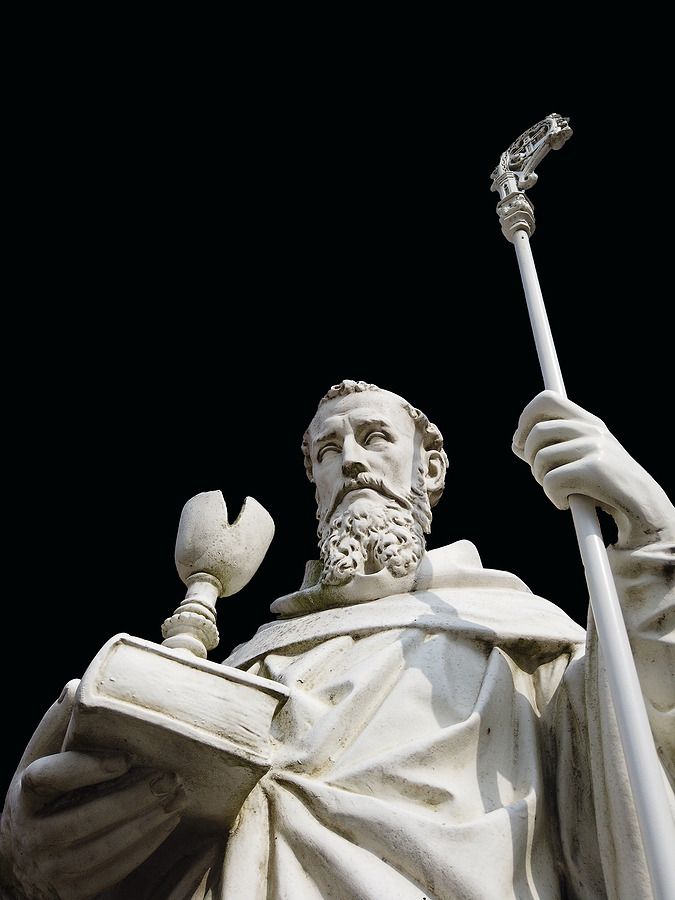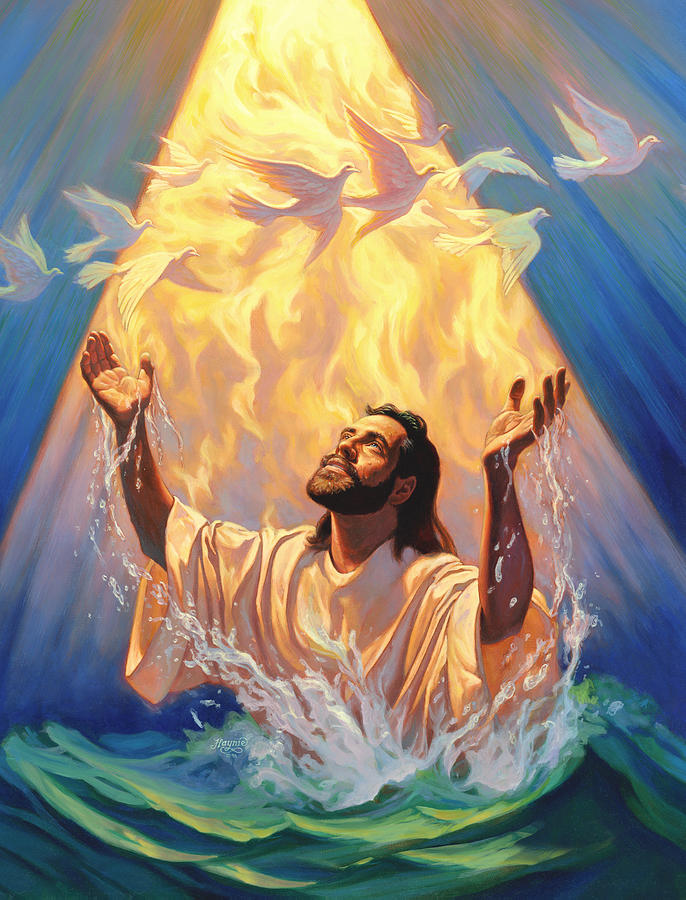
Thinking about the Rule of Benedict and the Baptism of the Lord.
The Prologue of the Rule of Benedict contains some of the most lryical, lush and arresting prose ever written. These words from the 5th century summon, urge and admonish with utmost delicacy.
L I S T E N carefully, my child,
to your master’s precepts,
and incline the ear of your heart (Prov. 4:20).
Receive willingly and carry out effectively
your loving father’s advice,
that by the labor of obedience
you may return to Him
from whom you had departed by the sloth of disobedience.
To you, therefore, my words are now addressed,
whoever you may be,
who are renouncing your own will
to do battle under the Lord Christ, the true King,
and are taking up the strong, bright weapons of obedience.
And first of all,
whatever good work you begin to do,
beg of Him with most earnest prayer to perfect it,
that He who has now deigned to count us among His children
may not at any time be grieved by our evil deeds.
For we must always so serve Him
with the good things He has given us,
that He will never as an angry Father disinherit His children,
nor ever as a dread Lord, provoked by our evil actions,
deliver us to everlasting punishment
as wicked servants who would not follow Him to glory.Prologue-The Rule of Benedict
Even though it’s been over twenty years, I can clearly visualize that small red booklet,
The Rule of Benedict. I became Catholic at St. Benedict’s Abbey in Still Water, Massachusetts and grabbed the red booklet from the gift shop to adopt as my own. Along with the two tomes I’d been assigned by Brother Andrew, the monk who was assigned the task of teaching me the rudiments of our Catholic faith, I was ready to work. I wanted it all: Now.
In those early years, I bought and lost at least five of those small booklets. Hoping with each new purchase, it wouldn’t feel like reading gibberish. That I could make sense of these words.
But I couldn’t.
Of course not!
I could barely spell Catholic.
So quickly I forget that I can’t do it alone, that the timing is not mine.
It would be another six years before the Rule became my school. Yes, school:
…And so we are going to establish
a school for the service of the Lord.
In founding it we hope to introduce nothing harsh or burdensome…
For as we advance in the religious life and in faith,
our hearts expand
and we run the way of God’s commandments
with unspeakable sweetness of love (Ps. 118:32).
Thus, never departing from His school,
but persevering…
During my years as a Benedictine Oblate, I’ve read the little rule over fifty times. Three times each year, we read through its seventy-three chapters. And yet each time we begin anew, I look forward eagerly to the Prologue.
Always, it feels new-thinking, yet again about the rule of Benedict.
When it happened, my initial conversion felt sudden, impetuous even precipitous-as if I’d jumped off a cliff. That is until pondering all that came before and accepting that the real precipice had been the one of unbelief.
It’s odd, isn’t it, how clearly we can see when looking through the rearview window?
My favorite phrases in the Prologue?
“…by the labor of obedience you may return to Him from whom you had departed by the sloth of disobedience…my words addressed to you who are renouncing your own will to do battle under the Lord Jesus Christ, and are taking up the strong, bright weapons of obedience…
Therefore we must prepare our hearts and our bodies to do battle under the holy obedience of His commands; and let us ask God that He be pleased to give us the help of His grace for anything which our nature finds hardly possible. And if we want
to escape the pains of hell and attain life everlasting, then, while there is still time, while we are still in the body and are able to fulfill all these things by the light of this life, we must hasten to do now what will profit us for eternity.”
Obedience.
That word’s a lightning rod and has been for almost as long as I remember. But is there a virtue more critical than is obedience?
Or it’s cousins habit and discipline?
It’s why He came, right?
He came to show us that the only path back to God the Father is obedience.
Maybe it’s easier for converts like me to grasp the need for ongoing conversion: Conversion as in repentance-rethinking. Especially so for those of us whose faith did not just become lukewarm, but decided that it was all a myth: the Bible, faith, God. And walked away.
I remember, as a brand new Benedictine Oblate, many years ago, being fascinated by the word stability. Axiomatic of Benedictine spirituality, it’s a promise made at our oblation. The word connotes stasis…an inner permanence despite external turbulence. We vow to stay put, regardless of what is happening in our marriage, our body, our family or the world.
To many in this change-loving culture of ours, this concept of permanence, of a changeless inner core, evokes a trap, oppression-even that word we see everywhere: slavery. But I’ve learned that it is when I am most uncomfortable, even frightened, that if I stick there, accept the terror…that the view from the other side is breath-taking.
If…only if, I refuse my turbulent emotions. Stomp on my will and trust His Spirit…desiring only His Will.

Our Byzantine friends call tomorrow Theophany
Theophany is defined as a visible manifestation of a deity, a visible manifestation of God to man by actual appearance. The glory of these Christmas days which end with this day.
Can we ever even glimpse the immensity of the graces showered on humanity with His Baptism?
Saint Maximus, Bishop of Turin, explains in the Second Reading of the Office for last Friday, why God became man:
Here is the reason why God became a perfect man, changing nothing of human nature, except to take away sin (which was never natural anyway). His flesh was set before that voracious, gaping dragon as bait to provoke him: flesh that would be deadly for the dragon, for it would utterly destroy him by the power of the Godhead hidden within it. For human nature, however, his flesh was to be a remedy since the power of the Godhead in it would restore human nature to its original grace.
Just as the devil had poisoned the tree of knowledge and spoiled our nature by its taste, so too, in presuming to devour the Lord’s flesh he himself is corrupted and is completely destroyed by the power of the Godhead hidden in it.
The great mystery of the divine incarnation remains a mystery for ever. How can the Word made flesh be essentially the same person that is wholly with the Father? How can he who is by nature God become by nature wholly man without lacking either nature, neither the divine by which he is God nor the human by which he became man?
Faith alone grasps these mysteries. Faith alone is truly the substance and foundation of all that exceeds knowledge and understanding.
From the Five Hundred Chapters by St Maximus the Confessor




Beautiful, Lin!
That in all things, God may be glorified—happy new year!
Happy New Year to you and your family, Genevieve- and thank you for the read and taking time to write. Blessings for all that you’ll do to glorify our Lord this next year!
Beautifully stated. I share your faith and desperation to follow Him. Thank God for your gift of faith and the written word.
What a splendidly perfect phrase my friend: “desperation to follow him.”
YES!